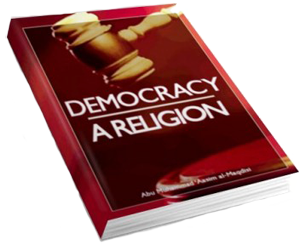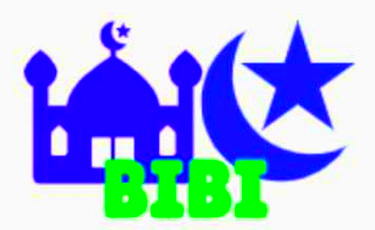Hub For Your Daily Islamic Insights 🕋 🕌

Democracy - A Religion, An analysis of democracy from an Islamic perspective
An analysis of democracy from an Islamic perspective
Free
Unveil a provocative perspective on modern governance with 'Democracy - A Religion.' This thought-provoking book delves into the foundations of democracy, analyzing its characteristics as a belief system and examining its profound influence on society through both theological and philosophical lenses. Carefully researched and eloquently argued, it engages readers with compelling discussions grounded in intellectual and religious evidence. Perfect for students, academics, and readers passionate about religious studies, political philosophy, and comparative religion, this volume offers fresh insights that challenge conventional wisdom. Available in a convenient paperback format with a sleek matte finish, this book's compact size makes it ideal for study or travel.
Democracy as a concept is often viewed through various lenses, each with its own values, principles, and implications. In recent years, an intriguing perspective that has emerged is the analysis of democracy from an Islamic standpoint, where it can be interpreted as a form of governance that resonates with certain religious principles, thus leading to the interpretation of democracy as a ‘religion’ in its own right. At its core, democracy is predicated on popular sovereignty - the idea that power rests with the people who have the right to choose their leaders and shape their governing systems. This fundamental principle of empowerment might seem to align with Islamic teachings about justice and consultation, known in Arabic as 'shura.' In Islam, the concept of 'shura' underscores the importance of collective decision-making and the necessity for leaders to consider the opinions of the governed, which mirrors, to some extent, the democratic principle of representational governance. In Islamic jurisprudence, the idea of governance is not merely about exerting power but is intrinsically linked to the responsibility of the ruler to act in the best interests of the people. This notion is grounded in the Qur'an and Hadith, which emphasize justice ('adl'), equality, and the welfare of the community. The caliphate, as depicted in early Islamic history, functioned on similar lines, where leaders (caliphs) were seen as representatives of the people, accountable for their actions while still upholding Islamic principles. Hence, one can argue that classical Islamic governance had democratic elements, though perhaps not in the modern, Western conception of democracy. However, the modern application of democracy in predominantly Muslim countries has elicited mixed reactions. On one hand, there are advocates who argue that principles of democracy are compatible with Islamic teachings. They see elections, equal representation, and civil rights as fulfilling the Islamic imperative for justice and accountability. Proponents reference examples where Islamic values can bolster democratic frameworks, suggesting that systems built on mutual respect and accountability can enhance societal welfare in conformity with Islamic ethics. On the other hand, there are critics within the Islamic community who assert that democracy, especially as it has evolved in the West, is antithetical to Islamic values. The claim is that secular foundations of many democratic systems inherently conflict with the religious and ethical tenets of Islam. These critics argue that the West's individualistic approach may contradict the collective responsibility emphasized in Islamic teachings. Moreover, the fear of losing societal order and moral governance when reduced to mere competitive politics is a concern among those who prefer a governance model strictly rooted in Islamic law (Sharia). To add another layer of complexity, the secularization of politics in the West poses additional challenges. Political systems that are purely secular may lack consideration for moral dimensions derived from religious teachings, potentially leading to disenchantment with governance among religious populations. Thus, the discussion transcends mere mechanics of voting or law-making; it becomes a broader debate about the essence of moral authority and how it should be exercised within a government. In the context of ethics and morality, Islamic scholars have argued that governance should not only involve the enforcement of laws but must also promote ethical behavior in society. This is where the ‘religious’ aspect of democracy can emerge, as the principles of justice, equality, and societal welfare can be seen as deeply ingrained in both democratic rhetoric and Islamic teachings. Furthermore, a democratic process that encourages an open dialogue about various ideologies, including Islamic tenets, allows for a richer understanding of how governance can align with diverse values. One of the significant challenges to the discussion of democracy in Islamic societies is the interpretation of Sharia. While some envision Sharia strictly as a legal framework, others advocate for a more holistic understanding including spirituality, ethics, and the social contract between the state and its citizens. This divergence can lead to varying positions on whether democracy could be anchored within a framework that incorporates Islamic principles, thus emerging as a unique hybrid system potentially termed as 'Islamic democracy.' There is also the question of representation in a democracy - who gets to represent the voice of the people, especially in countries where sectarian divides exist? The notion of representation in a democracy should reflect the pluralistic nature of society, further marrying the ideas of Islamic unity with democratic principles of inclusion. This aspect signifies the importance of creating a political landscape where diverse voices are recognized and valued, reinforcing the imperative for 'shura' as congruent with democratic representation. In summation, the analysis of democracy from an Islamic perspective reveals a complex and nuanced relationship. While certain principles of democracy resonate with Islamic teachings, challenges persist regarding the implementation and acceptance of democratic frameworks in societies with a strong religious identity. Moving forward, the discourse should aim for a synthesis of values – combining democratic ideals of freedom, equality, and justice with the moral imperatives of Islam, thereby navigating towards a governance model that respects both the faith and the evolving political consciousness of the people. Thus, it would be prudent to explore democracy not merely as a political system but as a dynamic space where philosophical, ethical, and religious considerations converge. Such an examination may lay the groundwork for innovative governance models that foster inclusivity, respect, and shared moral responsibilities, contributing to the social dynamism exemplified in modern democracies while remaining true to Islamic ethical frameworks.
